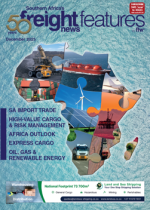Airfreight imports are projected to rise towards the end of the year as consumers and companies expedite year-end obligations, choosing air transportation over sea freight for their cargo needs.This need for faster delivery times and reduced shipping delays, especially during the holiday season, was good news for airfreight volumes, said Paul Danvers, commercial director for Groupair South Africa."Capacity is, however, tight, and large volume shipments need to be planned carefully," he said, indicating that the increased demand for airfreight services may lead to constraints on available cargo space, which could affect pricing and the ability to secure shipment slots.Asked about other challenges, Danvers said a weak rand was far from ideal compared to major currencies. "However, in my opinion, its impact may be more pronounced in the retail sector compared to the industrial sector. The retail industry often relies heavily on imported goods. When the local currency weakens, it can increase retailers' costs, potentially resulting in higher consumer pr ic e s."In contrast, the industrial sector, which may focus more on domestic production or export-oriented operations, could sometimes mitigate the adverse effects of a weak currency by capitalising on international markets and potentially benefiting from increased competitiveness in export markets. Groupair, established initially as an export service provider, has seen substantial growth in its import business. More notably, there have been recent changes in how the company approaches its quoting process. "Implementing dedicated import estimators and operations agents to handle confirmed shipments has significantly streamlined our workf low. This positive change has had a notable impact on our client interactions. It ensures that each step of the import process is efficiently managed by specialists, leading to smoother operations and, most importantly, improved communication and satisfaction for our clients."He said the company was optimistic about its import outlook, considering South Africa remained a net importer. Also, with sea freight under pressure, volumes would move to airfreight, a trend expected to continue into the new year."Predictions in the current geopolitical climate remain exceedingly challenging. The repercussions of the Middle East crisis on global trade are yet to materialise fully, and the effect on exchange rates remains uncertain. Furthermore, many sectors depend heavily on foreign supply chains, and this dependency may lead to heightened logistics input costs. These uncertainties make it imperative for businesses to adopt f lexible strategies and stay vigilant in adapting to the evolving international landscape," said Danvers.

